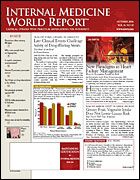The Final Word on Soy Isoflavone Therapy for Hot Flashes?
Previous studies which claimed that soy isoflavone supplements did not help alleviate symptoms of hot flashes in menopausal women might have used products containing insufficient levels of genistein—a key component in soy isoflavone—and therefore be incorrect, according to new data (Menopause. 2006;13: 831-839).
In addition, although many previous studies included a variety of isoflavone sources, the individual components of the isoflavones assessed were not always identified.
Isoflavones are found most abundantly in soybeans. The 3 principal isoflavones in soy are genistein, daidzein, and glycitein.
In an effort to determine the true efficacy, or lack thereof, of isoflavone supplemental therapy in menopausal women, lead investigator Patricia S. Williamson-Hughes, PhD, and colleagues evaluated published studies that used well-characterized isoflavone-containing supplements.
The final analysis included 11 studies that used similar total soy isoflavone doses (dose range, 30-114 mg/d of isoflavone equivalents).
Of the 745 women (average age, 52.2 years) who participated in these studies, 378 (50.7%) were treated with soy isoflavones. The women reported approximately 5 daily hot flashes.
In 5 of the studies (n = 177), the isoflavone product provided >15 mg genistein per treatment, and all 5 studies reported a significant reduction in hot flashes.
Among the 6 studies (n = 201) that used a soy isoflavone product with <15 mg genistein per treatment, only 1 showed a significant decrease in hot flashes.
Genistein content in the isoflavone treatments used ranged from 7% to 16% in the low-genistein studies compared with 50% to 100% in the high-genistein studies.
These results suggest that it is the amount of genistein present in the dose rather than the total dose that may be important, the investigators say.
“We observed that soy isoflavone supplements that provide at least 15 mg of genistein per day are effective at alleviating hot flash symptoms, whereas providing less than 10 to 15 mg are not,” the investigators conclude.
